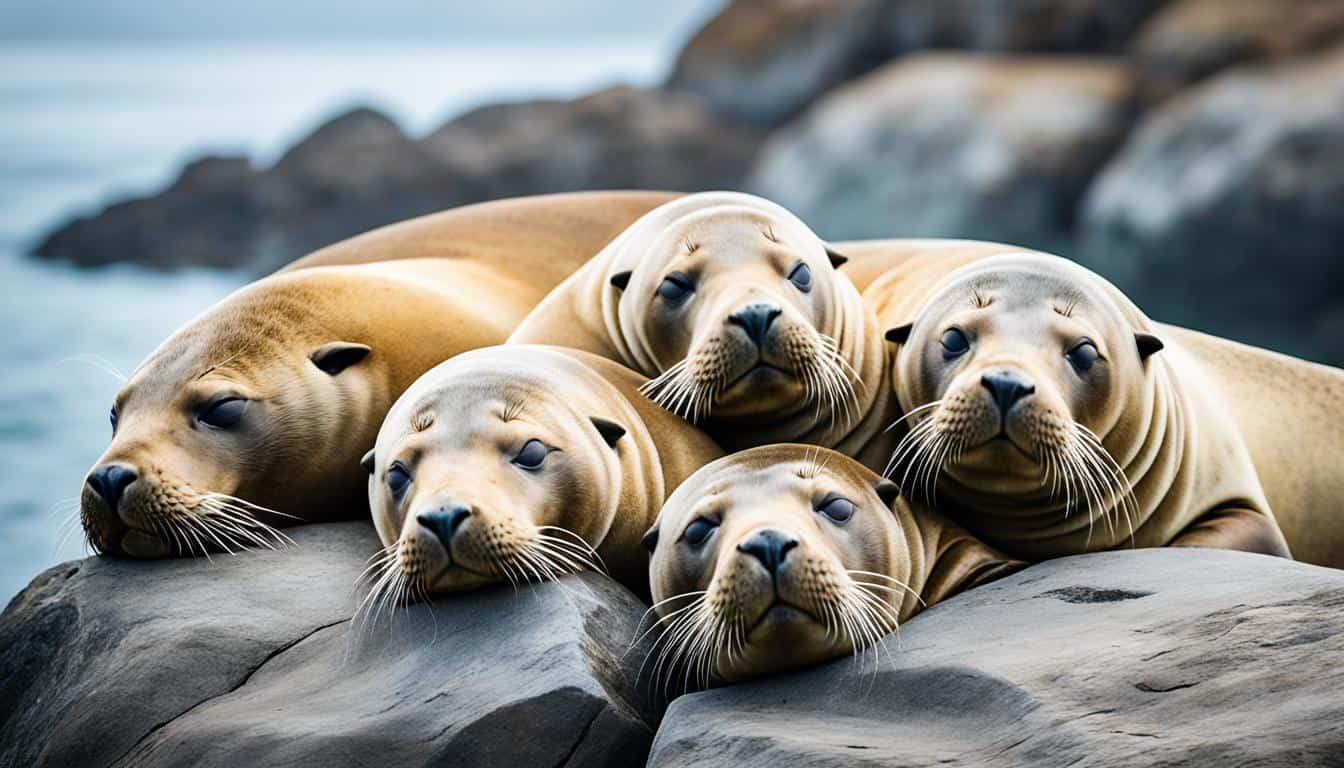Have you ever wondered how sea lions sleep? These marine mammals have sleep habits that are quite different from ours. They sleep in short sessions throughout the day, a type of sleep called polyphasic sleep. This way, they can rest while still staying alert for dangers.
Sea lions sleep in a way that helps them survive in their ocean world. By sleeping a little at a time, they make sure they’re always ready to defend themselves. This unique way of sleeping is key to their survival.
Understanding Sea Lion Sleep Patterns
Sea lions have interesting sleep habits that show how they adapt to their environment. These habits help us understand how sea lions sleep and what they need for rest.
What is Polyphasic Sleep?
Sea lions sleep in polyphasic sleep, which means they have many short sleep periods instead of one long one. This lets them hunt and socialize more, using their time wisely. They stay ready for changes in their surroundings while still getting enough rest.
Duration of Sleep
How long sea lions sleep can vary a lot. On average, they might sleep only two to three hours a day. Things like age, how active they are, and their health can change how much they sleep. Younger sea lions or those who are more active might sleep less but still get enough rest.
Where do Sea Lions Sleep?
Sea lions have unique ways of sleeping, showing how they adapt to their surroundings. They find the best spots to rest, balancing safety and comfort. This question shows how they choose between land and water for sleep.
Sleeping on Land vs. Water
Sea lions prefer sleeping in water over land. In the water, they can rest safely and avoid predators. They often float or dive in shallow waters, surfacing now and then for air.
On land, they sleep in groups on rocky shores or sandy beaches. They pile up together for warmth and safety. This way, they can sleep more deeply.
Common Sleeping Locations
Sea lions sleep in different places depending on their surroundings. Coastal areas in California are key spots for them. These places offer safety and chances to be with other sea lions.
The coastlines have both rocky and sandy areas perfect for resting. These spots let sea lions find a cozy place to sleep.

How do sea lions sleep?
Sea lions have unique ways of sleeping that show how they adapt to different places. On land, they often sleep on their sides or backs, together for warmth. This shows how social they are and helps them stay warm in the cold.
In the water, their sleeping habits are even more interesting. They can float on the surface or dive briefly to rest. This lets them pick the best way to sleep based on where they are, keeping them safe.
Sea lions can sleep with half their brain awake and the other half resting. This means they can still watch for dangers while they sleep. This skill is key to their survival in the wild.
Learning about sea lion sleeping habits gives us a peek into their lives. Whether on land or in the sea, they have ways to rest while staying alert. This helps them stay safe and ready for anything.
Factors Affecting Sea Lion Sleep Habits
Sea lion sleep habits are influenced by many factors. These include their environment and threats from predators. These elements shape how and when they rest.
Environmental Influences
Sea lion sleep is affected by water temperature, weather, and the seasons. Changes in water temperature make them change their sleep times. They like to rest in cooler water to keep their body temperature down and avoid getting too hot.
Bad weather like storms or strong winds can also change their sleep patterns. They might look for shelter or sleep less during these times.
The Impact of Predators
Predators have a big impact on sea lion sleep habits. Sea lions have to watch out for sharks and killer whales. When these predators are close, sea lions sleep lightly. This way, they can quickly wake up and defend themselves if needed.
The Importance of Sleep for Sea Lions
Sea lions need good sleep to stay healthy and thrive. Sleep helps them recover from hunting and swimming. It’s key for their growth and fighting off diseases.
Not getting enough sleep can make sea lions stressed and sick. They must sleep well to live well in the ocean. Sleep keeps them healthy and helps their ecosystem stay balanced.
We must protect sea lions’ sleep for their health. Keeping their homes safe and quiet helps them rest better. Learning about sea lion sleep shows us why we should act to save these amazing animals and their homes.
FAQ
How do sea lions sleep?
Sea lions sleep in short sessions throughout the day. This is called polyphasic sleep. It helps them stay alert and avoid predators.
What is polyphasic sleep?
Polyphasic sleep means sea lions take short naps. These naps can last from a few minutes to half an hour. This way, they can hunt, swim, and socialize while still resting enough.
How long do sea lions sleep each day?
Sea lions sleep for about two to three hours a day. Their sleep needs change with age, activity, and their environment.
Where do sea lions prefer to sleep?
Sea lions like to sleep in the water for safety. But, they also rest on land in big groups on beaches or rocky shores.
Do sea lions sleep on land or in water?
They sleep in both places. In the water, they stay safe from predators. On land, they stay warm and socialize.
What are common sleeping locations for sea lions?
Sea lions often sleep in coastal areas of California. They rest in big groups on beaches and rocky platforms.
What positions do sea lions sleep in?
On land, they sleep on their sides or backs, sometimes together for warmth. In the water, they can float upright or dive deep for rest.
What factors affect sea lion sleep habits?
Things like water temperature, weather, and the seasons change how they sleep. They also stay alert for predators, which affects their sleep.
How do predators impact sea lion sleep habits?
Predators make sea lions stay alert while sleeping. This helps them react fast to threats, keeping them safe.
Why is sleep important for sea lions?
Sleep is crucial for sea lions’ health. It helps them recover from being active and supports their growth and immune system. Not enough sleep makes them stressed and more likely to get sick.







